Syria Says Israeli Planes Fire Missiles At Port City
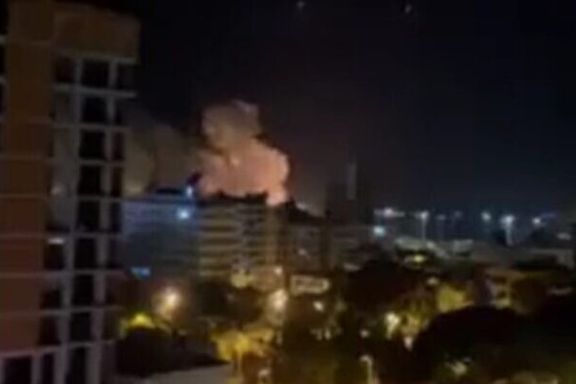
AP - Syria's military said Israeli warplanes fired missiles on the port of the coastal city of Latakia early on Tuesday without inflicting any human losses.

AP - Syria's military said Israeli warplanes fired missiles on the port of the coastal city of Latakia early on Tuesday without inflicting any human losses.
Syria's state media quoted an unnamed military official as saying that several missiles struck the containers area in the port setting some of them on fire.
The official gave no further details.
It was a rare attack on the port of Latakia, a vital facility where much of Syria's imports are brought into the war-torn country.
Syrian state TV reported that five explosions were heard in the port and a huge fire erupted in the containers area and fire engines have rushed to the port.
There was no comment from the Israeli military.
Israel has staged hundreds of strikes on targets inside government-controlled Syria over the years but rarely acknowledges or discusses such operations.
Some of the strikes in the past had targeted the main airport in the capital Damascus.
Israel has acknowledged, however, that it targets the bases of Iran-allied militias, such as Lebanon's Hezbollah group that has fighters deployed in Syria.
Israel says Iranian presence on its northern frontier is a red line, justifying its strikes on facilities and weapons inside Syria.
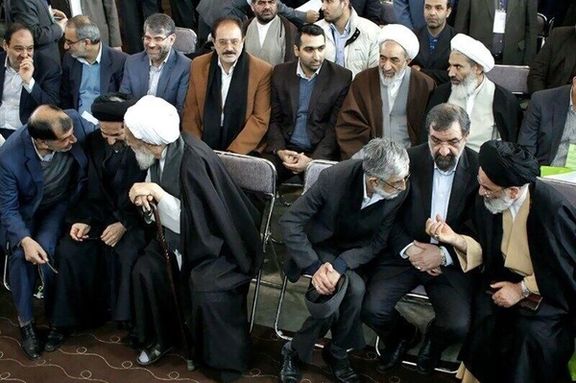
Iran’s conservatives supporters Supreme Leader Ali Khamenei, are divided like an archipelago with many small islands linked by loose bridges, a pundit has said.
Speaking in an interview with Khabar Online website, conservative analyst Hossein Kanani Moqaddam said every single one of those tiny islands has its own ruler.
Kanani Moqaddam, the political secretary of the Iranian conservative camp's Resilience Front also tried to define the conservative's status in Iran's politics by explaining that although they are in power, they lack coherence.
However, unlike Kanani Moqaddam, prominent conservative analyst Naser Imani has said that conservatives in Iran are better organized than the country's reformists, although both are more unpopular today as they have ever been.
Other analysts, including Tehran University academic Kiumars Ashtarian separates the traditional conservative camp from its newest wing that is nicknamed as "the revolutionary current." It consists of young hardliner conservatives in the Iranian parliament. According to Ashtarian, those who belong to this group are driven by their dreams and illusions, a characteristic that brings them under the general label of idealists.
However, Ashtarian believes that these young hardliners will be soon diverted to the main track of conservatism in Iran once they experience the reality of Iranian politics and come face to face with its barriers at the parliament.
Another non-traditional wing of Iran's conservative camp is known as the ultraconservative Paydari party, who are mostly former supporters and officials of ex-president Mahmoud Ahmadinejad.
Like many other observers, Kanani Moqaddam believes that Paydari always finds it difficult to be a team player. The party has been frequently accused of preventing coherence in the conservative camp by disrupting any balancing coalition at the last moment. This has been happening over and over in all parliamentary and presidential elections after the 2009 presidential election.
Asked to pass his judgment about the status of President Raisi and Ahmadinejad in the conservative camp, Kanani Moqaddam said Ahmadinejad has never been a conservative. He simply used Iran's conservatives as a ladder to climb the political structure and claim the President's seat. Once he made it to the presidency, he let down his conservative allies, Kanani Moqaddam said.
His judgment about Rouhani was different. According to Kanani Moqaddam, a former lawmaker said that Rouhani was a conservative who made it to the presidential palace by an alliance with Iran's reformists and moderates. However, according to Kanani Moqaddam, the main element that led to Rouhani's victory in the election was the bad record of President Ahmadinejad and his populist administration. The people did not want another president like Ahmadinejad, he said.
Meanwhile, Kanani Moqaddam added that Raisi's election as President has led to a fierce rivalry among conservative groups and further divided the conservative camp as every group tried to seize as much power and financial resources as they could.
On the likelihood of Raisi's success in the absence of non-conservative challengers in Iran's political landscape, Kanani Moqaddam opined that regardless of the situation Raisi is unlikely to be able to solve Iran's problems during the first four years of his presidency. However, he did not say what is likely to happen if few vote for him for a second term, or if Khamenei who engineered his victory in June 2021, concludes that Raisi should be replaced.
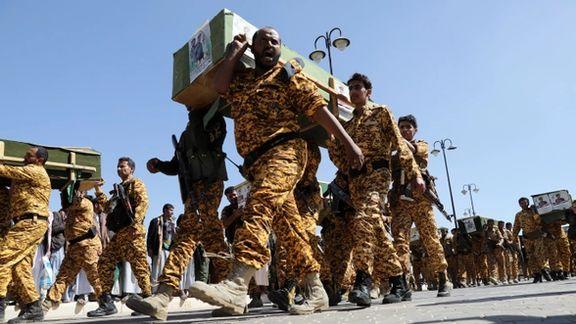
Yemen's Iran-backed Houthis held military funerals on Monday for 25 fighters killed in battles with the Saudi-led coalition in the Marib region.
Fighting shows no sign of abating despite intense international diplomacy to end the seven-year-old conflict.
The funerals took place as fighting has raged in the gas-rich Marib region, while warplanes from the coalition have intensified their bombing of Sanaa, Marib and other areas.
The Houthis have also stepped up cross-border attacks on Saudi Arabia using armed drones and missiles.
An honor guard carried the coffins - draped with flags, flowers and photographs of the dead - with military music through the capital Sanaa. Relatives gathered to mourn their loved ones.
"We are in these days inspired by these martyrs' pride and dignity and say to them: 'congratulations! You have preceded us to a paradise as wide as the heavens and earth'," said Ali Muhyaddin, a relative of one of the dead.
The war in Yemen has killed tens of thousands and caused what the United Nations describes as the world's largest humanitarian crisis.
UN-led efforts to agree a ceasefire have stalled in the conflict, which is seen largely as a proxy war between Saudi Arabia and Iran.
Report by Reuters
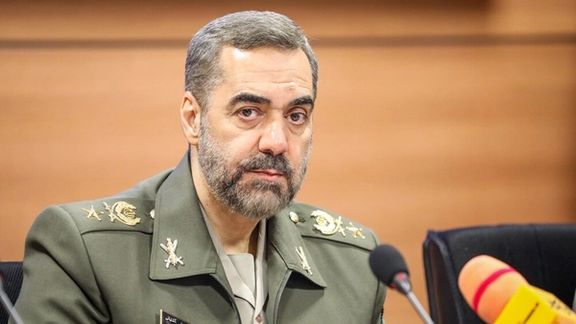
Iran’s defense ministry is creating an “economic headquarters” to coordinate and marshal its capabilities for more effective business and commercial operations.
In a meeting of the ministry’s Strategic Council on Monday chaired by Defense Minister Mohammad-Reza Gharaei Ashtiani, a host of other officials were present, including directors of “ideological-political” offices, intelligence and counterintelligence, and managers of the ministry’s business subsidiaries, official government news website IRNA reported.
Iran’s defense ministry operates within the framework of the presidential administration, but the chief commander of all armed forces is Supreme Leader Ali Khamenei. The armed forces are divided to two separate armies, the Islamic Revolution Guard Corps (IRGC) and the traditional army, the Artesh. The IRGC carries tremendous political and economic power in the country, in effect controlling the traditional army.
The main tasks of the defense ministry is development of weapons and equipment for the armed forces. Most of the Islamic Republic’s homegrown military and dual-use technologies, such as drones, are developed by the ministry. This role was highlighted in the meeting of the Strategic Council, where the defense minister praised Mohsen Fakhrizadeh, the nuclear-military scientist who was assassinated near Tehran in November 2020, most likely by Israel.
The defense minister said that Fakhrizadeh was “a source of great services to the holy Islamic regime and he was able to make great strides in developing military industries.”
It is not clear what the exact plans for an economic coordination taskforce would be and the state-controlled media did not elaborate. But from the brief announcement made it seems that the defense ministry wants to marshal its capabilities to play a larger role in helping the economy in an environment of tough United States sanctions.
It is also possible that in a tough economic environment the ministry wants to establish more control over companies it controls. Various people or interest groups are benefitting from the ministry's resources, businesses and factories. Creating an economic task force could allow the leadership to channel all economic activities to benefit the ministry in a more meaningful way.
Ashtiani, mentioned the keyword “centralization” of economic activities as a necessity.
Since the early 1990s, after the end of the Iran-Iraq war, the IRGC was allowed to set up businesses and get involved in the economy. Then-president Akbar Hashemi Rafsanjani who made the decision thought that it could benefit both the country and the tens of thousands of veterans who had fought for years in the battlefield. But IRGC’s business ventures turned into a quest of building an economic empire that today dominates the country. The military force has become the biggest public works contractor in Iran, sweeping aside private businesses.
The same was emulated by the defense ministry to a lesser extent. Fakhrizadeh, who was a top defense ministry official had set up businesses, an Iran International report revealed last year after his assassination. His family indirectly respondedin an interview with the state TV in early December 2020, in which they acknowledged that he did indeed owned “knowledge-based” companies.
Occasionally, the president of the country and even Khamenei have urged to military to curtail their economic activities, but these calls have been met with IRGC’s pushback. In July 2017, President Hassan Rouhani had to retreat after speaking of a “government with guns”, referring to IRGC’s political and economic power.
On Monday, Ashtiani referred to the president and Khamenei when he said the new economic headquarters is meant to help meet their “expectations”.
He also mentioned, “Monitoring both domestic and foreign economic environment, identifying corresponding opportunities, economic policy-making,” and a host of coordinating tasks for the economic headquarters.
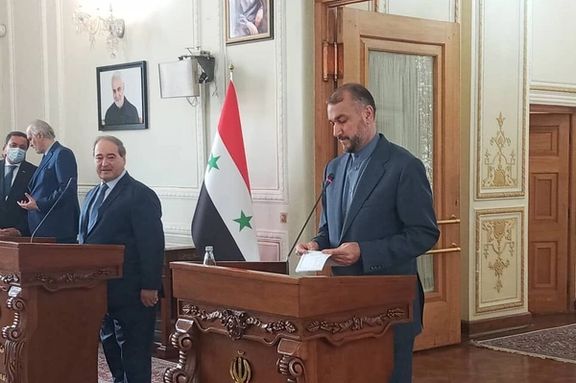
Iran’s foreign minister said Monday that relations between “a few Arab states and the Zionist regime” is not in the interest of stability and peace in the region.
Hossein Amir-Abdollahian who was speaking at a joint press conference with visiting Syrian foreign minister Faisal Mekdad also demanded the exit of foreign forces from Syria that are present “without coordination with the sovereign government elected by the Syrian people.”
The establishment of full relations last year between the United Arab Emirates and Bahrain with Israel was a sign of Tehran’s inability to isolate its arch enemy in the region. Iranian officials also made veiled threats against Arab countries willing to establish ties with Israel.
Iran strongly opposes the presence of a few hundred US troops in Syria that were stationed when the United States was fighting the Islamic State group with help of local militias.
Amir-Abdollahian also expressed satisfaction that some Western and Arab countries are reconsidering their policies in regard with Syria.
Iran played a pivotal role in defending Bashar al-Assad’s government from opposition forces in the Syrian civil war by dispatching troops and financial assistance.
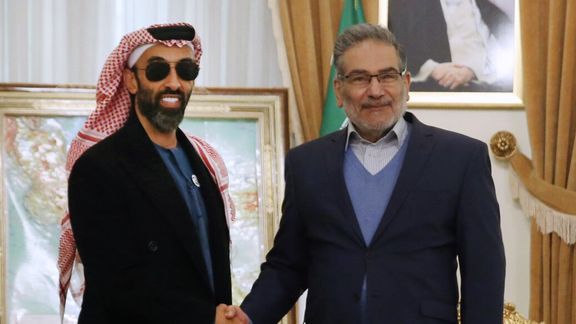
UAE's top national security adviser Sheikh Tahnoon bin Zayed Al Nahyan met in Tehran with President Ebrahim Raisi and national security chief Ali Shamkhani.
The Iranian government’s news website IRNA reported that Shamkhani told Tahnoon, “warm and friendly ties with neighbors as well as sharing economic, trade and investment potentials are the most important priority for the Islamic Republic in its foreign policy.”
Shamkhani in a veiled reference to the United States said that regional countries can cooperate to ward off “interventionist policies” by powers from outside the region.
Iran’s national security advisor called for mutual efforts with the United Arab Emirates to “end some military and security crises” that have caused hardship for the peoples of the region. He added, “Talks and mutual understanding should replace a military approach to solve differences.”
Later, President Ebrahim Raisi in his meeting with Sheikh Tahnoon reiterated the same positions, and also warning of Israel's influence in Arab countries, in a veiled reference to full relations between the UAE and Tehran's arch-enemy in the region.
"The Zionists in the region pursue their evil plans and wherever they can find a foothold, they try to use it as a tool for expansion and sedition, therefore, regional countries should be careful," Raisi said.
The United Arab Emirates and its ally Saudi Arabia have been fighting Iran-backed Houthi forces in Yemen since 2015. They also backed opposing sides in the Syrian civil war. The Sunni Gulf states see Iran’s aggressive regional policies, including arming and financing militant networks as a serious threat to their security.
IRNA says that Tahnoon in turn told Shamkhani Iran as a large and powerful country has a unique geopolitical position in the region and expanding “warm and brotherly ties” between Abu Dhabi and Tehran is a top priority for the UAE.
IRNA also quoted Tahnoon as saying that the two countries have significant potential for economic cooperation in transit, energy, health care and investments. He added, “It is necessary to form expert taskforces to pinpoint areas of cooperation in various economic fields.”
Iran has been using Dubai as a key outlet to international markets often referring to it as a one-stop-shop that could provide goods to Iran from a variety of Asian and other countries. Iranian trade and tourism has somewhat declined in recent years both because of cold relations between the two countries and also because of US sanctions reducing Iran’s economic interactions overall.
Many Iranian merchants maintain offices in Dubai where they have residence and business permits. Many Iranians also own real estate in Dubai and foreign-based satellite televisions constantly advertise properties in the UAE Iranians can buy with little or no legal restrictions.
Iran and Saudi Arabia also held talks earlier this year to reduce tensions, but Saudis have described the talks as exploratory, without any breakthroughs. No new meetings have been announced. Abu Dhabi has said that it will keep Riyadh and other allied abreast of it talks with Tehran.